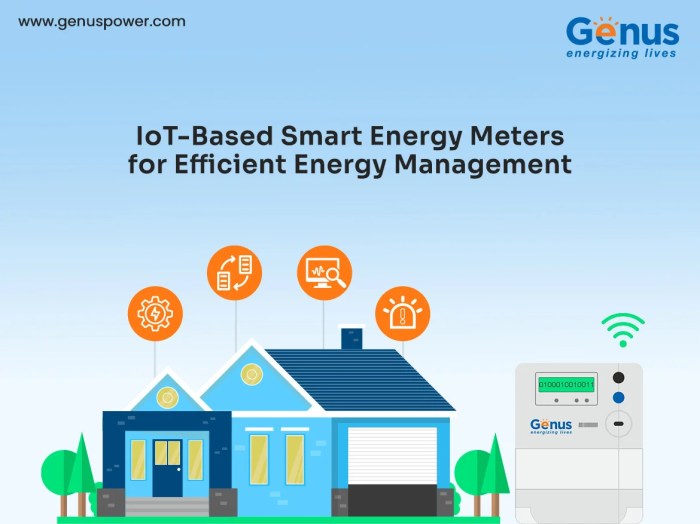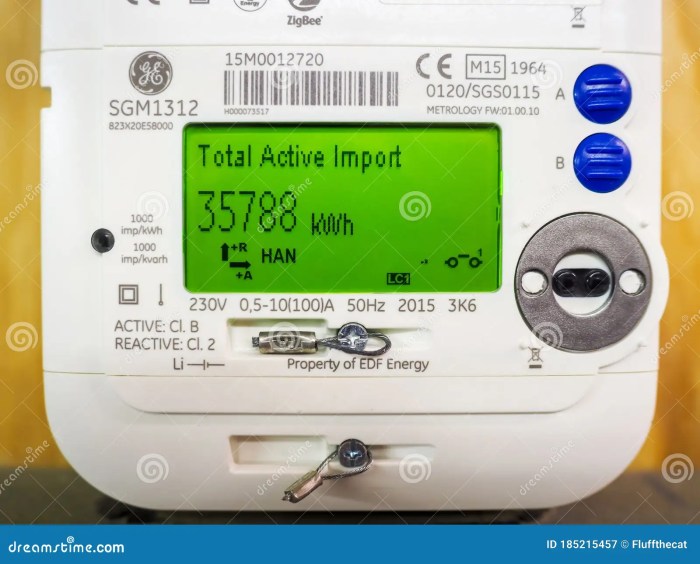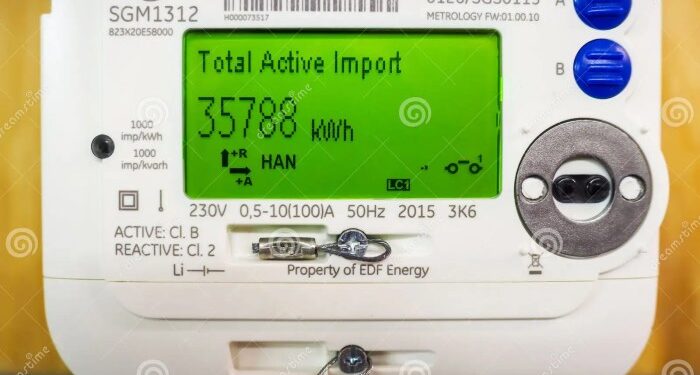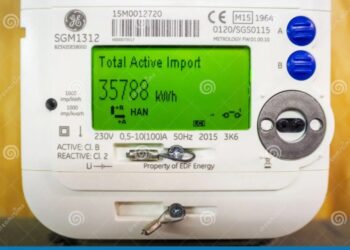In the realm of energy management, Smart electric meters and energy monitoring systems play a crucial role. This introduction sets the stage for a deep dive into the significance and impact of these advanced technologies.
The discussion unfolds with detailed insights and explanations, shedding light on the intricate workings of smart meters and monitoring systems.
Introduction to Smart Electric Meters and Energy Monitoring Systems

Smart electric meters and energy monitoring systems are innovative technologies designed to track and manage electricity consumption in residential, commercial, and industrial settings. These systems provide real-time data on energy usage, allowing consumers to make informed decisions about their electricity consumption.
Importance of Smart Electric Meters and Energy Monitoring Systems
Smart electric meters and energy monitoring systems play a crucial role in modern energy management by promoting energy efficiency and sustainability. These technologies help users identify energy-intensive appliances, detect energy wastage, and optimize energy consumption patterns.
Differences Between Smart Meters and Traditional Meters
Smart electric meters differ from traditional meters by offering advanced features such as two-way communication, remote monitoring, and real-time data analytics. Unlike traditional meters that require manual readings, smart meters automatically transmit usage information to utility providers.
Benefits of Using Smart Electric Meters and Energy Monitoring Systems
Enhanced Energy Efficiency
Smart meters enable users to track their energy consumption in detail, leading to more efficient energy usage.
Cost Savings
By identifying energy-saving opportunities, smart meters help consumers reduce their electricity bills.
Environmental Impact
Energy monitoring systems contribute to lowering carbon emissions by promoting sustainable energy practices.
Remote Monitoring
Smart meters allow users to access their energy usage data remotely, providing convenience and control over electricity consumption.
How Smart Electric Meters Work
Smart electric meters are advanced devices that measure and record electricity consumption in real-time. These meters utilize innovative technology to provide accurate data and offer various benefits to both consumers and utility companies.Smart meters work by constantly monitoring energy usage and collecting data at regular intervals.
Unlike traditional meters, smart meters can transmit this information wirelessly to the utility provider, eliminating the need for manual readings. This automation improves efficiency and reduces the likelihood of errors in billing.
Data Collection and Transmission
Smart meters use communication technologies such as Wi-Fi, cellular networks, or powerline communication to transmit data to a central system. This data includes details on energy consumption, peak usage times, and potential issues such as power outages or voltage fluctuations.
By analyzing this information, utility companies can optimize their grid operation and provide better services to customers.
Role of IoT in Smart Metering
The Internet of Things (IoT) plays a crucial role in smart metering by enabling seamless connectivity between devices. Smart meters can communicate with other IoT-enabled devices in a home or building, allowing for better energy management and efficiency. For example, smart thermostats can adjust temperature settings based on real-time energy usage data from smart meters, leading to cost savings and reduced environmental impact.
Real-Time Monitoring Features
Smart electric meters offer various real-time monitoring features that empower consumers to track their energy usage and make informed decisions. Some examples include:
- Instantaneous energy consumption display
- Customized usage alerts and notifications
- Data visualization tools for analyzing consumption patterns
- Remote access to energy data via mobile apps or online portals
These features help consumers understand their energy habits, identify areas for improvement, and ultimately reduce their electricity bills.
Benefits of Smart Electric Meters and Energy Monitoring Systems
Smart electric meters and energy monitoring systems offer various advantages to consumers, helping them to manage their energy usage more efficiently. These technologies play a crucial role in enhancing energy efficiency and promoting sustainability in the long run.
Advantages of Smart Electric Meters for Consumers
- Real-time monitoring of energy consumption: Smart meters provide consumers with accurate and timely information on their electricity usage, enabling them to make informed decisions to reduce wastage.
- Cost savings: By tracking energy usage patterns, consumers can identify opportunities to optimize their electricity usage and lower their utility bills.
- Remote access and control: Smart meters allow consumers to remotely monitor and control their energy consumption, providing convenience and flexibility.
Role of Energy Monitoring Systems in Reducing Energy Consumption
- Data-driven insights: Energy monitoring systems collect and analyze data on energy usage, helping consumers to identify inefficiencies and implement strategies for reducing consumption.
- Behavioral changes: By visualizing their energy usage patterns, consumers are encouraged to adopt more energy-efficient practices, leading to reduced consumption over time.
- Peak load management: Energy monitoring systems enable consumers to better manage their electricity usage during peak demand periods, contributing to grid stability and reliability.
Impact on Energy Efficiency and Sustainability
- Reduced carbon footprint: By promoting energy conservation and efficiency, smart meters and energy monitoring systems help to lower greenhouse gas emissions and mitigate climate change.
- Promotion of renewable energy integration: Improved energy management facilitated by these technologies supports the integration of renewable energy sources into the grid, fostering a more sustainable energy mix.
Case Studies and Success Stories
- In a study conducted by [Research Institute], households using smart meters were able to reduce their energy consumption by [percentage], resulting in significant cost savings over time.
Challenges and Limitations of Smart Electric Meters
Smart electric meters have the potential to revolutionize the way we monitor and manage our energy consumption. However, there are several challenges and limitations that need to be addressed for their widespread adoption and effective use.One of the main challenges in the adoption of smart electric meters is the initial cost of installation.
While smart meters can provide long-term cost savings by enabling more efficient energy use, the upfront investment required can be a barrier for some consumers and utility companies.
Privacy and Security Concerns
Smart meters collect detailed data on energy consumption, which can raise concerns about privacy and security. There is a risk that this data could be intercepted or misused, leading to potential breaches of privacy or even cyber attacks. It is essential for utility companies to implement robust security measures to protect the data collected by smart meters and ensure consumer trust.
Accuracy and Reliability
Another limitation of smart metering systems is the potential for inaccuracies in energy readings. Factors such as meter calibration, data transmission errors, and electrical interference can affect the accuracy of the data collected by smart meters. It is crucial for utility companies to regularly calibrate and maintain smart meters to ensure reliable and precise energy readings.
Overcoming Challenges and Improving Technologies
To address these challenges and limitations, utility companies can take several steps to improve the adoption and effectiveness of smart electric meters. This includes providing clear information to consumers about the benefits of smart meters, implementing strong data security measures, and investing in regular maintenance and calibration of smart metering systems.
Additionally, advancements in technology can help enhance the accuracy and reliability of smart meters, making them more efficient and user-friendly for consumers.
Wrap-Up

As we wrap up our exploration, the key takeaways from our discussion on Smart electric meters and energy monitoring systems are highlighted, leaving readers with a comprehensive understanding of the subject.
Query Resolution
How do smart meters benefit consumers?
Smart meters empower consumers by providing real-time data on energy usage, enabling better control and management of consumption.
What role does IoT play in smart metering?
IoT enables seamless communication and data transfer in smart metering, enhancing efficiency and accuracy in energy monitoring.
Are there any privacy concerns with smart meter data collection?
Privacy is a valid concern, but strict data protection measures are in place to safeguard consumer information collected by smart meters.
How do energy monitoring systems contribute to reducing energy consumption?
Energy monitoring systems provide insights into usage patterns, allowing users to make informed decisions that lead to more efficient energy use.













